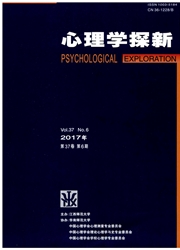

 中文摘要:
中文摘要:
具身认知理论主张自我认知是机体与环境的互动过程,基于具身认知的身体生物学特点、活动特征及自我身体表征等方面的实证性研究,不断明晰了自我经验中具身的重要作用.这些研究弥补了传统心理学关于自我-世界之间身心交互性研究的不足.具身认知作为自我认知的一种新兴解释视角,在自我研究上存在一些局限性,主要涉及具身化的对称性、双向性、自动化,以及自我研究的定性等问题.自我的具身研究应结合建构水平理论和隐喻理论来思考认知加工机制问题,并吸纳进化动机以及文化假说等观点的解释力度.
 英文摘要:
英文摘要:
Embodied cognition theory insisted that self - cognition was the interactive process between organism and environment. The paper gradually cleared the significance of embodiment in self - cognition based on the body biological characteristic, activities features and some empirical studies on the body self - representation. The previous studied complimented the weak fields of interactive studies on the mind - body interaction between self and world in general psychological. As a new theoretical notion, there existed limitation on the self study,which involved the symmetry, bi - direction and automation of embodied cognition and the problematical positioning of re- search. As a result,the future studies on embodied self should integrate the theory of constructive - level and metaphor to explore the mechanism of cognitive process ,while considering the essences of evolutionary motivations and cultural hypothesis opinions.
 同期刊论文项目
同期刊论文项目
 同项目期刊论文
同项目期刊论文
 The Self-Referential Processing in Concurrent Task-Irrelevant Affective Background Music: An ERPs St
The Self-Referential Processing in Concurrent Task-Irrelevant Affective Background Music: An ERPs St 期刊信息
期刊信息
